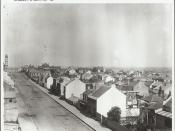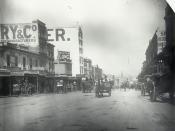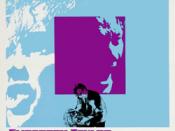Edward Albee's play "Who's Afraid of Virginia Woolf?" is a drama exploring the anxieties of modern life. By personalizing aspects of the epic Albee has inverted many of its features to create satire. This internalization pits individuals against each other and themselves. M. H. Abrams's definition of epic, in his book "A Glossary of Literary Terms," is used comparatively to demonstrate how Albee achieves satire.
Abrams's first definition of epic is the closest to which "Who's Afraid of Virginia Woolf?" adhere- it is about a serious subject. The seriousness of the play is developed through its language, which is not elevated or formal as in a traditional epic, rather, it is crude and intoxicated. When Nick and Honey arrive at George and Martha's place they are sober and speak formally. Any hesitation they have comes from the unusual situation they find themselves in. As they drink, Nick and Honey's involvement in the conversation becomes more fluid and the remarks become more poignant.
This, in turn, increases the intensity of the insults between George and Martha. For them prodding is a game of one-upmanship with words their only weapon. As the play progresses the implications of this become increasingly serious.
In an epic, Abrams explains that the "fate of a tribe, a nation, or the human race" lies in the out come of the hero's battle. The battle between George and Martha only affects their relationship and on this night spills into the lives of Nick and Honey. Drunkenness exaggerates their actions, so that the extremes of the situation are explored. This allows the reader to experience feelings which may be outside their own experience. George and Martha continually try to gain the upper hand in the relationship by degrading each other. This degradation is an...


